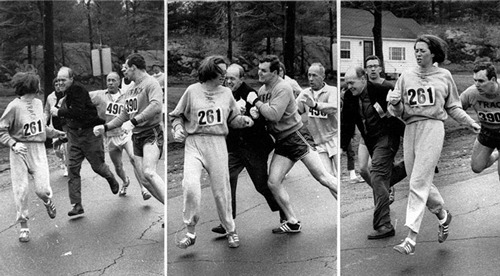
Race Officials at the boston Marathon tried to knock Switzer from the course in 1967. Photos by Harry Trask of Boston Traveler. Photo credit to the Boston Herald.
We’re no strangers to doing new and exciting things. As some of the pioneers to offer VoIP to businesses as a utility and reinventing what hosted communications look like again and again over the past 20 years, we know a thing or two about shaking things up – just like Dr. Marian Rogers Croak, the Voice over Internet Protocol inventor. But everyone including us, can take a lesson in challenging the norms as taught by Kathrine Switzer. Switzer was first made known to the world as, “K. V. Switzer,” when she became the first woman to ever have an entry into the Boston Marathon. And while Bobbi Gibb technically owns the record for the first woman ever to complete the iconic marathon, it was Switzer who, by being coy to register with her gender-neutral moniker, became the real Boston Marathon Trailblazer that opened the world of distance running to women everywhere.
Women Can’t Run a Marathon
Or at least that was the conventional wisdom of the time. In fact, in the mid 1960’s when women like Gibb and Switzer were already regularly logging 40 mile runs, the Boston Athletic Association, the body that oversees the Boston Marathon, was busy endorsing “scientific fact” that cited the life-threatening dangers women faced from endurance competition as defenses against allowing them to compete in the historic race. Well, although Bobbi Gibb’s unofficial race time technically was faster than hers, it was Switzer who earned the honor of logging the first, and therefore fastest ever, official marathon time for a woman. This respectable 4:20 has, of course, been bested many times over since Switzer ran in 1967, and in fact, 25-year-old Jordan Hasay broke the record for the fastest American woman’s marathon debut time with a blistering 2:23. To think that what Switzer accomplished that day 50 years ago can be distilled down into hours and minutes, though, is to miss the point entirely. She, over the course of a little over four hours, completely dismantled an entire network of propaganda that had been built to prevent women from participating in the joys of competitive endurance racing. And like all good positive disruptions, this one wasn’t over at the end of 26.2 miles.
It’s Not a Sprint, it’s a…
The story of Switzer and Gibb is a great way to remember that sometimes it’s worthwhile to break or bend some rules. Occasionally, systems that have stood in place for a long time need to be challenged. We support those efforts wholeheartedly. We’ve been challenging the powers that be ever since we hung our shingle and we don’t plan to stop making products that do that any time soon. Therein, specifically, is where the real message to take away from Switzer’s record-setting running career lies. The real message behind Switzer’s mark on history is a corollary for the marathon itself in that you need to prepare yourself for the long haul. To illustrate that running for gender equality is a long road, Switzer just set another new record by becoming the first woman ever to complete a marathon 50 years after her first. Switzer returned to Boston to run once more before retiring from the marathon distance.
She told the media that during her first Boston Marathon, “Every step of the way I felt paranoia. This year, all I felt was support.”
I think that if her first marathon didn’t create room enough for Switzer to be remembered forever as being a person of great strength and character, the fact that she came back half a century later to do it again most certainly should. Oh, and one more thing, at only 70-years-young, Switzer clocked a 4:44:31, not even a half hour over her first time.






